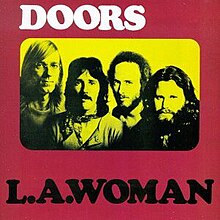The WASP (Texas Radio and the Big Beat)
| L.A. Woman | ||||
|---|---|---|---|---|
 |
||||
| Studio album by the Doors | ||||
| Released | April 19, 1971 | |||
| Recorded | December 1970 – January 1971 | |||
| Studio | The Doors' Workshop, Los Angeles, California | |||
| Genre | Blues rock | |||
| Length | 48:24 | |||
| Label | Elektra | |||
| Producer | The Doors, Bruce Botnick | |||
| the Doors chronology | ||||
|
||||
| Singles from L.A. Woman | ||||
|
||||
| Professional ratings | |
|---|---|
| Review scores | |
| Source | Rating |
| AllMusic | |
| Christgau's Record Guide | A– |
| Classic Rock | |
| Encyclopedia of Popular Music | |
| MusicHound | 4/5 |
| PopMatters | |
| Q | |
| Rolling Stone | |
| The Rolling Stone Album Guide | |
| Slant Magazine | |
L.A. Woman is the sixth studio album by the American rock band the Doors, released on April 19, 1971, on Elektra Records. It is the last to feature the group's lead singer, Jim Morrison, who died three months after the album's release. It saw the band continue to integrate elements of blues back into their music, a direction begun with their previous album, Morrison Hotel. It was also recorded without long-time record producer Paul A. Rothchild, after he fell out over the band's studio performance. Subsequently, the band co-produced the album with sound engineer, Bruce Botnick.
"Love Her Madly" was released as a single in March 1971, preceding the album's release, and it reached the Top 20 in the Billboard Hot 100. Upon release, the album peaked at number nine on the Billboard 200 and reached number 28 on the UK Albums Charts. An additional single in support of the album, "Riders on the Storm", also achieved chart success on Billboard and in the UK. Critics Richie Unterberger and David Quantick have both called L.A. Woman one of the Doors' best albums, citing Morrison's unwavering enthusiasm in his vocal performance, and the band's stripped-down return to their blues rock roots.
The Doors had achieved commercial and critical success by 1969, but for much of that year, they were blacklisted from radio playlists and their concert bookings dwindled, after singer Jim Morrison had been charged with profanity and indecent exposure stemming from a concert in Miami, Florida, on March 1. Promoters feared another episode like this. Morrison, who craved recognition as a serious poet and had also begun dabbling in film, had mentioned leaving the group at the end of 1968, only to be convinced by keyboardist Ray Manzarek to stay on another six months. On September 20, 1970, Morrison was convicted for the Miami incident. In a 1971 interview with Ben Fong-Torres, Morrison said of Miami, "I think subconsciously I was trying to get across in that concert, I was trying to reduce it to absurdity. And it worked too well."
...
Wikipedia
